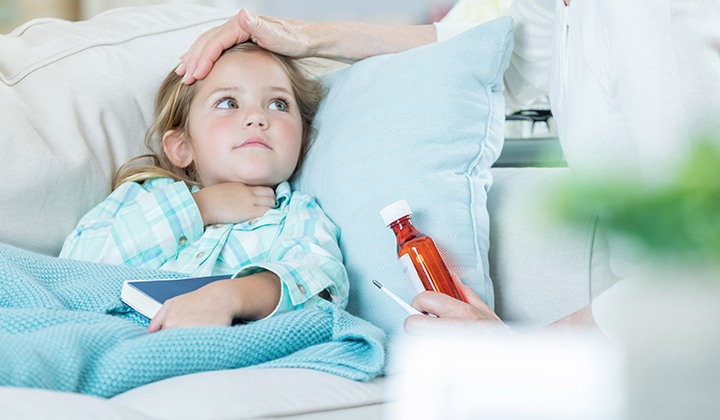Top 6 things the pros want you to know about antibiotics

When many of today’s parents were kids, they were prescribed antibiotics almost as often as they went to the doctor. A cough, an earache, or an upset stomach might all be treated with the same bubble-gum-flavored medicine. More recently, medical research has shown that antibiotics are most effective when they are prescribed more carefully, and not treated as a cure-all solution. These facts are intended to help families use antibiotics with maximum effectiveness and minimum side effects.
1. Antibiotics should be used with care.
Some types of medicine remain effective no matter how long or how often they are used. Antibiotics are not one of those medicines. Over time, they can lose their effectiveness. If they are overused or misused, they will not work the way they are meant to and the way we need them to. That is why many health care providers are prescribing antibiotics less often than providers did years ago. They want to make sure that antibiotics are the most appropriate treatment so that they remain effective in the long term.
2. Antibiotics don’t treat viruses.
Since antibiotics only treat bacterial infections and not viruses, not all infections need antibiotics. Some common symptoms children experience such as ear pain, sore throat, stuffy nose and green mucous don’t necessarily mean they have a bacterial infection, so they may not need to be treated with antibiotics. Even some bacterial infections should not be treated with antibiotics. For instance, diarrhea caused by a bacterial infection could be made worse by antibiotics. The good news is, most of these common symptoms that children experience clear up on their own within a week or so. If they do not get better within that timeframe, then it could be worth a visit to their health care provider.
3. The right antibiotic depends on the specific bacteria and the specific person.
Once your child’s health care provider determines that an antibiotic is the right treatment, they then carefully choose the right antibiotic for the specific infection and the individual child. There is not one super antibiotic for all infections. Just because a medicine is well-known or frequently prescribed does not mean it is the best medicine for your child’s infection. Your medical care provider will find the antibiotic that is most likely to be effective while limiting side effects.
4. Antibiotics work best when taken for the right amount of time.
Some infections last longer than others and need to be treated for a long time, for example bone infections. In most cases though, taking antibiotics for more days doesn’t always mean better treatment. Years ago, the thinking was that a few weeks of antibiotics was better than a few days. Now we know that many infections can be treated in 5-10 days. Taking antibiotics for the right amount of time ensures effective treatment and helps reduce unnecessary side effects.
5. Antibiotics, like all medications, have risks.
Reduce the likelihood of bad reactions by taking these tips to heart:
- Never give a child old or expired medication. Kids’ medicines are dosed according to their weight, so older medications may be ineffective or even harmful. Medicines can break down over time and cause side effects just by virtue of being expired. Medicines can also change formulation over time, so an old formulation may have different effects than a current version of the same medication.
- Never give a child another person’s medication, even another child’s. Medicines are prescribed specifically for a particular child of a certain age and weight for a specific type of infection. Sharing medicines runs the risk of causing side effects and allergic reactions. It also might only partially treat an infection and mask symptoms while making an infection worse. This makes it harder to find the right treatment, which could lead to a medicine with more side effects or more complicated treatment (like IV antibiotics instead of liquid or pills to be taken at home). If medications are dosed appropriately, there shouldn’t be leftover medication. Leftover medications should be disposed of properly. Many pharmacies accept leftover and expired medications.
- Give liquid medications with measuring spoons or cups, not with a spoon from the silverware drawer. Taking the right dose is as important as getting the right medicine.
6. Do seek medical care if…
- Your child’s symptoms get worse quickly or last longer than 10 days. A medical care provider will try to identify why the symptoms are worsening or lasting longer than expected and recommend appropriate treatment. If your child has ever had an allergic reaction to a medication, reach out to their doctor to get referred to a specialist. They can do testing to further identify your child’s allergies.
- Your child experiences lip swelling, trouble breathing, or hives after taking their medication (which usually show up in the first 48 hours). These can be signs of an allergic reaction that requires urgent medical attention.
- Your child is having five or more stools per day or vomiting so much they can’t keep any food down. These side effects could be caused by a variety of factors, not necessarily an allergic reaction, but you should still let your medical provider know. Most antibiotics will cause upset stomach, cramping, and looser stools, but the key is to notice if these symptoms go from mild to concerning.

